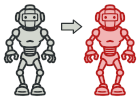
Rust 原型模式讲解和代码示例
原型是一种创建型设计模式, 使你能够复制对象, 甚至是复杂对象, 而又无需使代码依赖它们所属的类。
所有的原型类都必须有一个通用的接口, 使得即使在对象所属的具体类未知的情况下也能复制对象。 原型对象可以生成自身的完整副本, 因为相同类的对象可以相互访问对方的私有成员变量。
Built-in Clone trait
Rust has a built-in std::clone::Clone trait with many implementations for various types (via #[derive(Clone)]). Thus, the Prototype pattern is ready to use out of the box.
main.rs
#[derive(Clone)]
struct Circle {
pub x: u32,
pub y: u32,
pub radius: u32,
}
fn main() {
let circle1 = Circle {
x: 10,
y: 15,
radius: 10,
};
// Prototype in action.
let mut circle2 = circle1.clone();
circle2.radius = 77;
println!("Circle 1: {}, {}, {}", circle1.x, circle1.y, circle1.radius);
println!("Circle 2: {}, {}, {}", circle2.x, circle2.y, circle2.radius);
}
Output
Circle 1: 10, 15, 10 Circle 2: 10, 15, 77